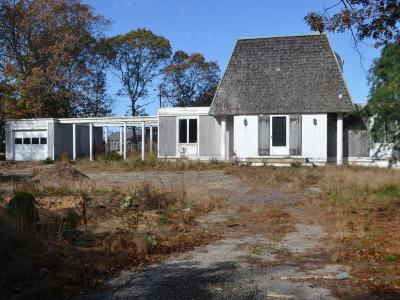Potentially Precedent-Setting House Plan Challenges Zoning Board

A plan to tear down a house, build a new one, and replace a swimming pool on a small lot in the Lion Head Beach neighborhood in Springs has raised the question of to what extent the East Hampton Town Zoning Board of Appeals should try to bring projects into conformity with the wetlands provisions of the town code.
The proposal, which was before the board at a public hearing on Oct. 24, had raised enough interest in the Planning Department that two staff members took the unusual step of speaking at the hearing.
Alex Zedlovich owns a long rectangular parcel, which is slightly smaller than a half-acre at 143 Isle of Wight Road, where he wants to build a 4,281-square-foot house and put in a larger pool than is there now with a patio. He seeks a natural resources special permit to build near wetlands as well as variances for the new pool and a planned retaining wall.
Although Jonathan Tarbet of Tarbet & Lester told the board at a lengthy public hearing on Oct. 24 that the applicant was revising the site plan and would present an updated one at a later date, he went on to point out that the "character of the neighborhood was set up in the '70s," and "unfortunately, everybody has pools 20, 30 feet from the wetlands."
That was just what the planners were worried about. They would like the zoning board to consider lots vacant and subject to current regulation when old houses and pools are removed.
The proposed increase in the size of the pool, from 568 to 966 square feet, also troubled Lisa D'Andrea, the first town planner to speak. "The Lion Head subdivision dates from the 1960s. The federal government, state governments, local governments did not realize the importance of freshwater wetlands or wetlands in general," she said.
"When you remove non-conforming structures, you have, in essence, a vacant property," she said, implying that whatever was pre-existing no longer obtained. She also complained that the applicant had presented much of his plans, including how he would revegetate the property, that morning. "It is kind of like being blindsided," she said.
John Whelan, the chairman of the board, however, said the Planning Department would have time to react to whatever new information Mr. Tarbet brings in.
Mr. Tarbet said the proposal calls for a state-of-the-art septic system, which will help protect Lion Head Pond East, which is adjacent to the site. He noted that the septic system had been moved 50 feet to conform to the town code, and went on to say that the house itself did not need variances because it would be situated farther from the wetlands than the existing structure.
Roy Dalene, a member of the zoning board, was concerned that the proposed pool's location remained the same and that it was to increase in size. "The pool is in the same location," he said. Variances are sought for the pool and retaining wall because they are proposed to be 75 feet and 90.7 feet from the wetlands while the code requires 100 feet.
Brian Frank, who is the Planning Department's chief environmental analyst, also spoke to the board, calling the application a case of "we know what the standards are, but we don't think we have to meet them. We are pre-existing." He said that when property owners "have the opportunity to conform to the town setbacks, they should."
East Hampton Town Trustee Tyler Armstrong, who was at the hearing as well, said the trustees were concerned with Pond East.
But Mr. Tarbet said that neither Mr. Frank nor Ms. D'Andrea could say that what was being proposed was not better for the pond than what is now on the property. He then got into a dispute with Ms. D'Andrea about whether the pond was brackish, insisting it was freshwater. Ms. D'Andrea responded by reading from a report prepared by the town in 1992 regarding the deteriorating condition of the pond.
". . .Lion Head Pond East is a coastal pond and historical remnant of Hog Creek, its biology, particularly its fish fauna in many ways mirrors that of Hog Creek. The pond's most common fish species are mummichog, mosquito fish, four-spined stickle back, Atlantic silverside, tidewater silverside, American eel, and banded killifish," all of which tolerate brackish water."
Mr. Tarbet told the board that, if the application were denied, Mr. Zedlovich could just keep what he has on the property.
"That house is uninhabitable," Cate Rogers, a Z.B.A. member, responded.
A decision is expected within weeks.
